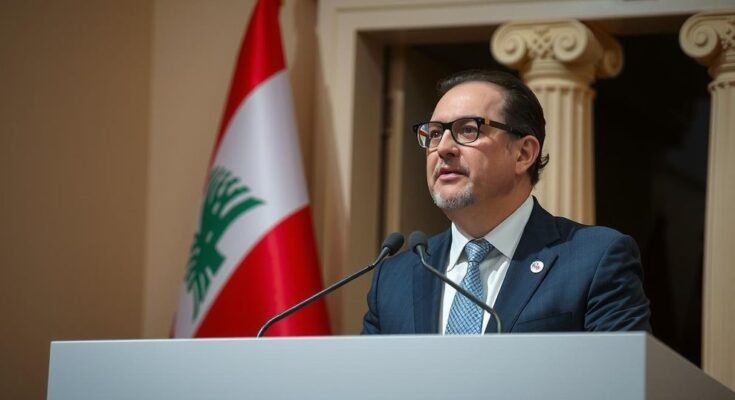Lebanon’s parliament elected Army Chief Joseph Aoun as president, ending a years-long political deadlock. His election followed significant efforts by the US and Saudi Arabia, and comes after Lebanon has been without a president since October 2022. Aongoing tensions between pro-Western and pro-Iran factions complicate the political landscape, but Aoun’s election may foster stability.
In a significant political development, Lebanon’s parliament has appointed Army Chief Joseph Aoun as the nation’s new president, thereby bringing an end to an extended period of political deadlock. Following two rounds of voting, Aoun, who enjoys the backing of both the United States and Saudi Arabia, secured the presidency amid renewed efforts to unify support around his candidacy. The country has operated without a president since former President Michel Aoun’s term concluded in October 2022, a situation exacerbated by the competition between factions aligned with Iran and those favoring Western influence.
Over the past two years, the parliament had made 12 unsuccessful attempts to elect a president, reflecting deep-seated divisions within Lebanese politics. The recent US-brokered ceasefire that concluded hostilities between Hezbollah and Israel likely accelerated the presidential election process. Hezbollah suffered significant losses in the conflict, which correlated with the diminishing influence of Iran-backed President Bashar al-Assad of Syria, a key ally that facilitated Hezbollah’s logistics and military aspirations across borders. Although the Lebanese army maintained a neutral stance during the conflict, its role was essential in implementing the ceasefire agreement, which includes stipulations for military deployments in Hezbollah-dominated areas.
Under Lebanon’s confessional political system, which allocates power among various religious groups, the presidency is traditionally held by a Maronite Christian. Joseph Aoun’s election is seen as a pivotal moment for Lebanon, potentially restoring a semblance of stability in a politically fragmented landscape.
Lebanon’s political landscape is historically characterized by a complex confessional system, where power is shared amongst different religious groups. This political arrangement has often led to lengthy stalemates, particularly in presidential elections. The recent parliamentary session culminated in Joseph Aoun’s election after an extensive vacuum following the end of Michel Aoun’s term in October 2022. The backing of Western nations, particularly the United States and Saudi Arabia, has shifted dynamics, especially given the context of heightened regional tensions and the influence of Iran-backed groups like Hezbollah.
Joseph Aoun’s election as Lebanon’s president is a crucial development for the country after years of political impasse. His alignment with US and Saudi interests may reshape Lebanon’s political dynamics, fostering potential stability. However, challenges remain, especially in managing the existing rift between pro-Western and pro-Iranian factions. The successful conclusion of negotiations surrounding this election underscores a pivotal moment that could facilitate Lebanon’s political recovery while navigating its confessional power-sharing system.
Original Source: www.cnn.com




